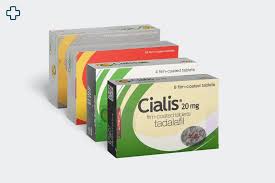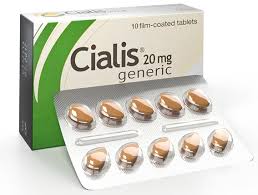Is Cialis Bad For You? It is a question that many men ask themselves before they decide to use this well-known erection aid. Cialis, with the active ingredient tadalafil, is known for its long-lasting effect of up to 36 hours. That sounds appealing, but are there also risks associated with its use? And what happens if you use it too often? In this blog we delve deep into science, medical background and practical experiences to find out whether Cialis is bad for your health in the short or long term.
What exactly is Cialis?

Cialis is a drug that belongs to the group of PDE5 inhibitors. It relaxes the blood vessels in the penis, allowing more blood to flow to the area during sexual stimulation. This makes it easier to get and maintain an erection. Cialis is especially popular because it remains effective for up to a day and a half, much longer than drugs such as Viagra or Kamagra.
The tablets come in different dosages, usually 5mg (for daily use), 10mg or 20mg (for occasional use). But what about safety?
Is long-term use of Cialis bad?
There have been several medical studies on the long-term use of tadalafil, and the results are generally positive. For healthy men who have no contraindications, the use is safe, provided it is done under medical supervision. However, there are side effects that occur more often with long-term use, such as:
- Headache
- Back pain
- Muscle pain
- Nasal congestion
- Dizziness
These symptoms are usually mild and disappear on their own. Serious side effects, such as vision or hearing problems, are rare but can occur.
Risks of incorrect use
Cialis is less suitable or even dangerous in combination with certain medications, especially nitrates for heart problems. This can cause a sudden drop in blood pressure, which can be life-threatening. Also for people with serious liver or kidney problems, the use of Cialis is not recommended without a doctor's advice.
Another risk is psychological: some men become dependent on erectile dysfunction drugs, even though they do not physically need them. This can lead to performance anxiety without medication and negative effects on self-image.
What do scientific studies say about the safety of Cialis?
To understand properly whether Cialis is bad for you, we need to look at the scientific literature. There have been dozens of clinical studies conducted worldwide on the safety of tadalafil for both occasional and daily use.
A large-scale 2014 study published in The Journal of Sexual Medicine, followed over 1,500 men who used tadalafil long-term (5mg per day) for a year. The conclusion was clear: most users experienced only mild side effects, and only a small percentage had to stop due to health problems. More importantly, the effect was maintained without the body becoming "accustomed" to the substance.
Other studies confirm that the risk of heart problems is not significantly increased in healthy men who use Cialis. On the contrary, in some men with mild blood pressure problems it even led to better blood vessel function.
Use under medical supervision
Most of the concerns surrounding Cialis arise when it without medical advice is used. Although you can order it online even without a prescription it is important to know if you are physically fit for its use.
A doctor will look at, among other things:
- Blood pressure
- Heart function
- Liver and kidney values
- Use of other medications (especially nitrates)
If this check shows that there are no medical impediments, is cialis generally safe to use.
Difference between occasional use and daily intake
Many people wonder if taking Cialis daily is worse than occasional use. The answer is: not necessarily. The daily dose is lower (usually 5mg) and ensures a constant level in the blood. This is mainly prescribed to men who experience structural erectile problems or who want to be able to have sex more spontaneously.
With occasional use (for example 10mg or 20mg before sex) there is a peak in the effect which then decreases. Both forms are safe if dosed correctly.
What do users say about side effects?
Although side effects are possible, most users experience only mild symptoms. In forums, reviews and conversations with customers, we often hear the following:
- “A slight headache, but I accept that”
- “I got some muscle pain from it, but that went away after a few times”
- “Sometimes a stuffy nose, but otherwise great stuff”
There is a small group of users who say they feel "drowsy" or "lightheaded" after use. This can often be traced back to overdose or combination with other substances, such as alcohol or blood pressure lowering drugs.
The psychological side: dependency?
An important but often underestimated aspect is the psychological dependence that some men can develop. Once a person notices that Cialis improves his performance, he may feel that he cannot do without it. This can lead to:
- Fear of failure without use
- Unnecessary use for psychological causes
- Low self-esteem in sexual context
That is why it is important to use Cialis conscious and purposeful to be used and not as a standard aid in every sexual encounter if it is not necessary.
Combinations and risks: when is Cialis bad for you?
The question "is Cialis bad for you?" is often asked by people who use other drugs, such as blood pressure lowering drugs, antidepressants, or recreational drugs. While Cialis is safe for most healthy men on its own, there are some combinations that carry risks.
1. Cialis and nitrates: life-threatening
If you are taking medications for heart problems, such as nitroglycerin or isosorbide dinitrate, you should definitely no Cialis use. The combination can lead to a sudden and dangerous drop in blood pressure. This is one of the few situations where the answer to the question is cialis bad for you? is a resounding “yes.”
2. Cialis and alcohol
A glass of wine or a beer is usually no problem. But excessive alcohol consumption in combination with Cialis can lead to:
- Dizziness
- Fainting
- Severe headache
- Low blood pressure
So you want to know: is cialis bad for you if you drink Then the following applies: it is safe in moderation, but avoid excessive alcohol consumption.
3. Cialis and blood pressure lowering drugs
Tadalafil can slightly lower blood pressure. If you are already taking medication for high blood pressure, always consult your doctor. In most cases, there is no problem, but the dosage may need to be adjusted. Is Cialis Bad For You in combination with these agents? Not necessarily, but it does require medical supervision.
Myths and Misconceptions: What's Wrong?
There are many misconceptions about Cialis circulating on the internet. Time to dispel a few myths:
"Cialis makes you addicted"
Incorrect. Cialis does not contain any addictive substances. However, psychological dependence can develop, as discussed earlier. But on the question is cialis bad for you because you can't do without it? The answer is: only if you use it unconsciously or unnecessarily without working on the cause of erectile dysfunction.
"Cialis reduces fertility"
There is no scientific evidence that Cialis has a negative effect on fertility. Some studies even show that it can improve sperm quality not affected. No negative effects have been found with long-term use. So: is cialis bad for you if you want children? According to current science: no.
"It gives you heart problems"
This is a misconception. In healthy users, Cialis has no increased risk demonstrated on heart conditions. It acts on the blood vessels, but in a way that widens them and improves blood flow. Caution is only advised in people with existing serious heart conditions. Again: is cialis bad for you? Not if you are healthy and use the correct dosage.
Listen to your body
Everyone reacts differently to medication. Where one person experiences hardly any side effects, another may feel a bit light-headed. The best way to determine whether Cialis is right for you is to listen carefully to your body and discuss its use with a doctor if you have any doubts.
Before each use, ask yourself: is cialis bad for you in my situation? If you have no contraindications and you feel comfortable using it, there is usually no reason to worry.




